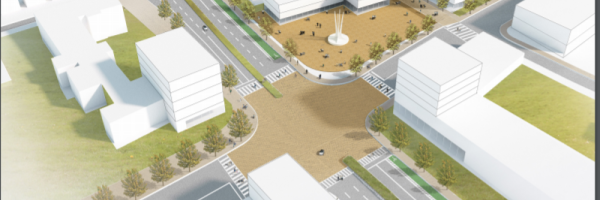Empowering walkable and bikeable communities using smart Decision Support System integrated with Vehicle-to-Everything communication
| Empowering walkable and bikeable communities using smart Decision Support System integrated with Vehicle-to-Everything communication | |
|---|---|

| |
 Seat Pleasant Trail Crossroads | |
| Team Organizations | WIOMAX LLC City of Seat Pleasant MD |
| Team Leaders | Jenipher Wang Xiao-Feng Xie Eugene Grant Mohamed Abdelhameid |
| Participating Municipalities | Seat Pleasant MD |
| Status | |
| Document | None |
Description
WIOMAX has developed a smart Decision Support System (DSS) integrated with Vehicle-to-Everything (V2X) for better road safety and increased urban mobility. The main purpose of this project is to apply the smart transportation solution and incorporate pedestrians and cyclists as beneficiaries of the innovative technology, for empowering walkable and bikeable communities through enhancing road safety, sustainability and smartness of cities.
Challenges
Moving towards sustainability while making tremendous strides into digital transformation, the city of Seat Pleasant, Maryland expects to apply smart transportation technology to improve road safety and to increase walkability and bikeability of communities.
Solutions
We propose a Smart City collaboration with the City of Seat Pleasant, Maryland for exploring the practical benefits from increasing walkability and bikeability of cities through applying WIOMAX’s smart DSS system integrated with V2X communication into practice, especially regarding new bike trail along Maryland Route 214 that connects Prince George's County, Maryland, with DC.
Major Requirements
- Create project scope, requirements and plan to confirm project direction and discuss priorities
- Develop system architecture
- Upgrade the DSS system for walkable and bikeable community
- Integration of V2X communication for pedestrian and cyclists into DSS system
- Explore examining district and cases for performance test; design and roll out performance tests
- Public announcement to gain stakeholder support and buy-in from the community, launching
Performance Targets
| Key Performance Indicators (KPIs) | Measurement Methods |
|---|---|
|
|
Standards, Replicability, Scalability, and Sustainability
- Requires common wireless communication and intersection infrastructure such as GPS, CANBUS, approaching vehicle detector at intersection, wireless vehicle-to-infrastructure communications.
- Standardized processes are not unique to city or region and can be replicated and scaled up in multiple cities/communities. The solution is planned to be replicated across the United States.
- The system will have its own business model to create sustainable revenue stream.
Cybersecurity and Privacy
Vehicle-to-Everything (V2X) communication is integrated into the smart decision support system. Accordingly, system and services are ensuring the cybersecurity and privacy of nationally accepted standards.
Infrastructure domain
- Infrastructure is managed by city with physical access control to prevent unauthorized use.
- Minimum amount of data is distributed at the infrastructure side as using edge computing technology.
- Any data on storage are encrypted with Advanced Encryption Standard (AES) 256bits.
- Data aggregation will be performed at infrastructure to remove privacy information. There is a risk mitigation plan to assess and minimize cybersecurity risks.
- Intrusion detection is used to alert and prevent unauthorized network usages.
V2X domain
- Secure connections are used: encrypted wireless secure connections and transport layer security authentication to provide privacy and data integrity.
User domain
- Only limited user data stays locally at their devices, and user data is preprocessed to remove user privacy information
- All data on storage are encrypted with Advanced Encryption Standard (AES) 256bits.
- Security module is embedded in user devices to verify the authenticity of devices reporting to it.
User Privacy
- Ownership and usage policies of data are clearly outlined in contracts.
- Permission of user’s data collection must be granted by users.
- Device owners can change their directives at any time.
- Compliance to United States data protection and privacy regulations.
Impacts
- Reduction of traffic crashes and traffic time; increase of sustainable transportation modes and first- and last-mile connections
- Reduced driving for short trips, improved quality of lives on safety, health, and environment
- Support economic development in terms of the increase of walkability and bikeability’s potential for creating jobs, improving the accessibility to local businesses, and enhancing property values
Demonstration/Deployment
A project demonstration will take place in the Spring 2019 GCTC Expo, where we will reveal our prototype and demonstrate initial results at one intersection for empowering walkable and bikeable communities. At future GCTC expositions, we will perform systematic experiments and demonstrate scalability by increasing number of the intersections.